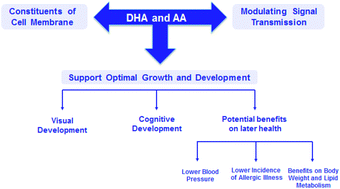An update on adding docosahexaenoic acid (DHA) and arachidonic acid (AA) to baby formula
Abstract
Human milk is the ideal food providing optimal nutrition for healthy term infants. Its complex lipid composition is critical for infant growth and serves as a golden standard for baby formula development. Docosahexaenoic acid (C22:6 n − 3, DHA) and arachidonic acid (C20:4 n − 6, AA) are the two major long chain polyunsaturated fatty acids (PUFAs) in human milk. In humans, they are fundamental components of the cell membrane and play an important role in neurite growth and signal transmission. Their importance for both preterm and term infants has been demonstrated by various clinical trials. DHA and AA supplementation shows desirable influences on visual and cognitive development in early life and is additionally associated with potential benefits on later health. Further clinical data revealed that supplementing both DHA and AA instead of DHA alone during infancy is important to deliver the optimal outcome. In this review, we summarize current research and scientific evidence of DHA and AA on baby development.


 Please wait while we load your content...
Please wait while we load your content...